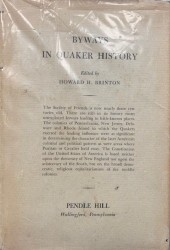Synopsis
“This collection of essays is much more than a memorial dedicated to that earnest scholar and forceful advocate of world peace, William Isaac Hull [1843-1939], late Jenkins Professor of Quaker History and Research, at Swarthmore College. Composed as it is of papers written by persons prominent for public service and scholarship, the volume offers to the general reader an authoritative and interestingly written cross-sectional view of Quaker history, thought, and ideals.” —Thomas Franklin Currier, The New England Quarterly (Dec. 1945)
Edited by Howard Brinton, who also wrote the introduction and contributed Dreams of Quaker Journalists, this compendium includes the following writings:
Introduction – Howard H. Brinton
William I. Hull, A Biographical Sketch – Janet Whitney
Whittier’s Fundamental Religious Faith – Rufus M. Jones
Whittier as Historian of Quakerism – Henry J. Cadbury
Whittier, the Quaker Politician – C. Marshall Taylor
The Career of Elias Hicks – D. Elton Trueblood
French and German Friends of the Early Nineteenth Century – William Wistar Comfort
Elihu Coleman, Quaker Anti-Slavery Leader – Thomas E. Drake
James Logan and Stenton – Charles F. Jenkins
Early Thought on the Inner Light – Crand Blanshard
Quakers Then and Now – George A. Walton
The Quakers in London and Their Printers There – Charles M. Andrews
Dreams of Quaker Journalists – Howard H. Brinton
George Fox as a Man – Frank Aydelotte
From the front cover: “The Society of Friends is now nearly three centuries old. There are still in its history many unexplored byways leading to little-known places. The colonies of Pennsylvania, New Jersey, Delaware and Rhode Island in which the Quakers exerted the leading influence were as significant in determining the character of the later American cultural and political pattern as were areas where Puritan or Cavalier held sway. The Constitution of the United States of America is based neither upon the theocracy of New England nor upon the aristocracy of the South, but on the broad democratic, religious equalitarianism of the middle colonies.”






